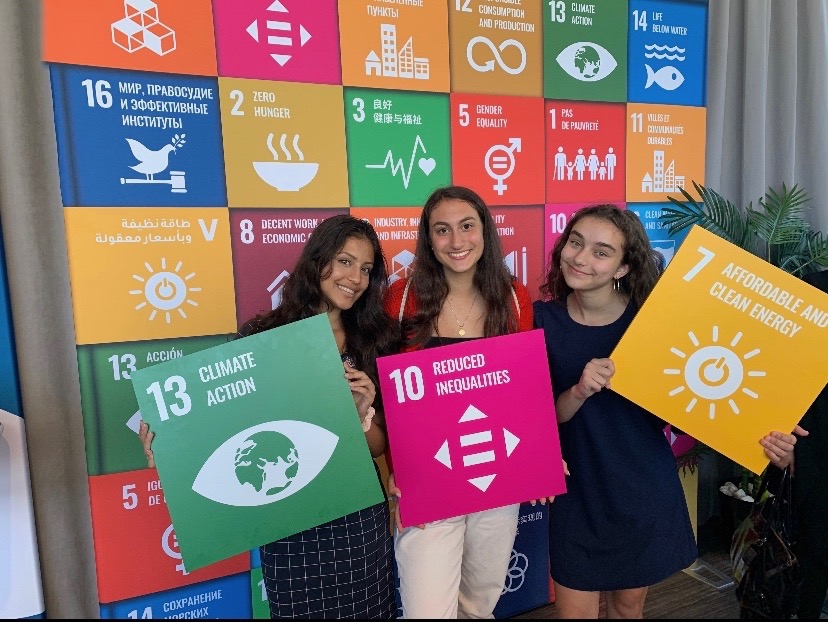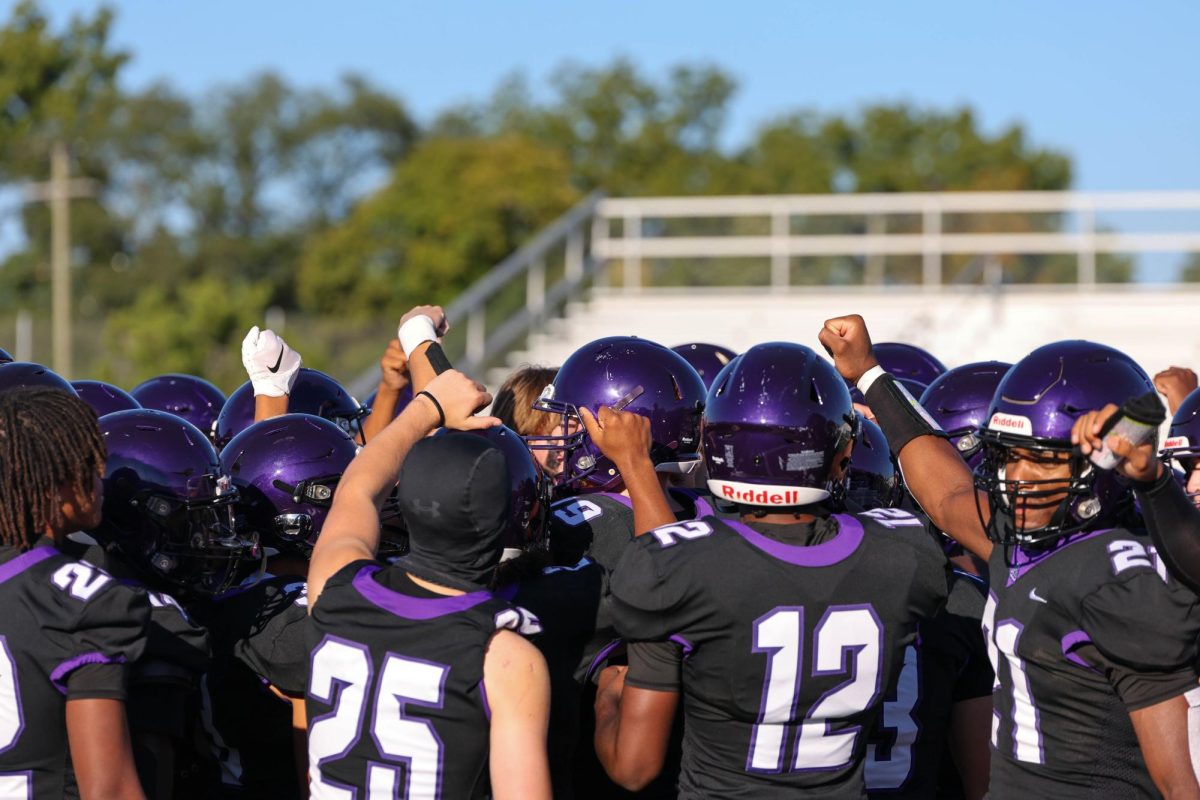In action
March 12, 2020
When young Naina Agrawal-Hardin realized there was no recycling bin at Starbucks, she took matters into her own hands. Armed with a cardboard box, she tirelessly stood outside the door, asking customers to put their recyclables inside. All her life, she has composted, recycled, joined sustainability clubs and picked up litter outside her middle school.
“I was doing all this individual action,” Agrawal-Hardin said. “But I knew it was never going to be enough.”
On March 15, 2019, Agrawal-Hardin helped organize the Global Climate Strike. This was her first time organizing such a highly-attended event. Because of her involvement, she was thrown into a whole new world of connections and communication. This is when she first heard about the Sunrise Movement.
The Sunrise Movement involves young people who all have the same goal: stopping climate change. They have created millions of good jobs in the industry of sustainable energy.
“There are over 300 Sunrise clubs in communities across America who are working towards a Green New Deal at the local level,” Agrawal-Hardin said. “There’s also a national team that provides resources to the people organizing on the ground across the country and engages with politics at the national level.”
After attending her first Sunrise meeting, Agrawal-Hardin felt like she wasn’t alone in this fight.
“I felt like I was in a space full of people who had a plan to win against the climate crisis.” Agrawal-Hardin said. “It was so exciting because it finally felt achievable.”
Agrawal-Hardin is a junior in high school and as she is beginning to look at colleges, the looming threat of the climate crisis is always a primary factor in her decisions.
“When I think about where I want to apply, one of the first things I think about is ‘is this place going to be underwater in a couple years?’” Agrawal-Hardin said. “Is this place going to become increasingly dry and have drinking water shortages, or is this place going to have increased earthquake activity or hurricanes in a couple of years?”
The next chapter of Agrawal-Hardin’s life is very much connected to these issues, both on a small scale and a large scale. For example, a warmer planet is a “breeding ground for germs,” and the amount of diseases that will increase with the rising temperature is substantial.
“The consequences of inaction are so far reaching,” Agrawal-Hardin said. “Every aspect of our society is going to be so drastically different.”
As the youth movement sweeps over our nation, many older people are left wondering how they can show their support.
“I would say one thing for older people who have more financial privilege to do is donate, because almost all of these organizations that I work with are funded exclusively on grassroots fundraising, so even small donations are helpful,” Agrawal-Hardin said. “When you’re donating to a youth movement your money is going directly into the hands of someone who’s out knocking doors every single day, or someone who has dropped out of school to fight for their future.”
The other thing that adults can do to help is to talk to youth activists. The youth movement cannot win without some outside support; they need the help of their adult allies to vote for someone who will prioritize climate change.
“We know that young people demographically are more progressive than older people and we know that young people are more in favor of aggressive climate action,” Agrawal-Hardin said. “But we need older people to get on board in order to win — especially in the lead up to the 2020 election.”
One of the essential tasks in reducing the amount of fossil fuels being used is to stop the influence of fossil fuel funding in politics.
“It’s important to get as many candidates as we can to take the no fossil fuel money pledge saying that they won’t accept contributions from fossil fuel CEOs,” Agrawal-Hardin said.
“Statistically what we’ve seen is that politicians who do take money from those corporations are significantly less likely to advocate for policies that are going to stop climate change.”
But once candidates are on board with fighting climate change, what is the next step? Bernie Sanders is the candidate Agrawal-Hardin feels will answer this question.
“I am mobilizing for senator Bernie Sanders,” Agrawal-Hardin said. “This is because of his record of consistency — not only in environmental justice but also racial justice, economic justice and a whole host of other issues that I know are really deeply tied to climate change. I think he also has the most ambitious climate plan.”
The Green New Deal — Sanders’ climate plan — is a proposed package of U.S. legislation that aims to deal with two twin crises of economic inequality and climate change.
“The idea behind it is that we transform our economies from fossil fuels to renewable energy sources within the next decade,” Agrawal-Hardin said. “And in the process we employ tons and tons of people to do things like retrofitting buildings and building windmills or maintaining solar panels or whatever it might be.”
The strategy of taking workers away from the nonrenewable energy industry and employing them in environment orientated organizations will boost the economy and play a role in stopping climate change. But the Green New Deal will only do so much. A huge amount of individual action is key to ending the climate crisis. This can be hard, as plastics and fossil fuels are such a huge part of the economy today. Many teenagers want to help, but don’t know where to start. Agrawal-Hardin believes that one of the most important things to do, especially this year, is to have conversations with family and friends.
“Talk about why you want them to vote for a climate champion in the 2020 election, why you want them to mobilize before the 2020 election,” Agrawal-Hardin said. “And why comprehensive climate action is so important to our generation.”
The other important thing to do is to show up.
“Come to a meeting!” Agrawal-Hardin said. “There’s going to be a coalition of groups, including sunrise and a bunch of local organizations, starting to meet regularly in the next couple of weeks, to start planning the Earth Day climate strike. You can totally join an organization, even if you have limited time!”
Joining the Sunrise movement made Agrawal-Hardin feel like she was making a difference.
“The strategy that Sunrise uses just clicked so well for me and I was really able to see how what the organization had done had been effective.” Agrawal-Hardin said. “What we are planning to do in the future is going to be effective and that was demonstrated really well.”
They have already had several victories. One that was especially empowering for Agrawal-Hardin was the climate town halls which all of the major candidates attended and spoke at, on one or two networks. They were posted because of direct pressure from young activists, like Agrawal-Hardin. This victory for the movement showed how important activism is — even for people that can’t vote. Climate change impacts everyone, and whether it’s joining an organization or putting recycling bins outside of stores, everyone needs to do their part for there to be a future.












